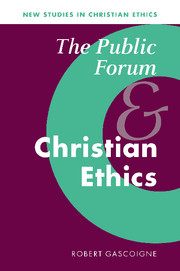Book contents
- Frontmatter
- Contents
- General editor's preface
- Acknowledgements
- Introduction
- 1 Revelation and reason in liberal societies
- 2 Revelation and a contemporary public ethics
- 3 The theology of revelation and Christian identity
- 4 The communication of Christian ethics in the public forum
- 5 Reconciling autonomy and community
- Select bibliography
- Index
1 - Revelation and reason in liberal societies
Published online by Cambridge University Press: 22 August 2009
- Frontmatter
- Contents
- General editor's preface
- Acknowledgements
- Introduction
- 1 Revelation and reason in liberal societies
- 2 Revelation and a contemporary public ethics
- 3 The theology of revelation and Christian identity
- 4 The communication of Christian ethics in the public forum
- 5 Reconciling autonomy and community
- Select bibliography
- Index
Summary
LIBERALISM AND REVEALED TRADITION
The development of liberal and pluralist societies has offered individuals a range of life styles and a freedom of expression without precedent in the traditional societies of the past. Liberal societies have removed any substantive unitary tradition of values from the public forum, freeing their members to pursue any conception of the good, so long as the freedom of others is not thereby restricted. This freedom from a unitary tradition is also a freedom from the violence which stems from the attempt to assert one tradition as the sole claimant to the status of shared and public conception of the good.
The reaction to the violent assertion of the unity of religious and political allegiance in the post-Reformation conflicts was a crucial historical factor in the genesis of liberal societies. If religious differences led ineluctably to protracted and mortal combat, then religion could no longer form the central focus of meaning and allegiance of any polity. In the aftermath of the wars of religion, many thinkers and statesmen developed theories of the state's legitimacy based not on religion but on the state's own nature as a contract or as a necessity for the preservation of basic human needs.
- Type
- Chapter
- Information
- The Public Forum and Christian Ethics , pp. 11 - 44Publisher: Cambridge University PressPrint publication year: 2000

